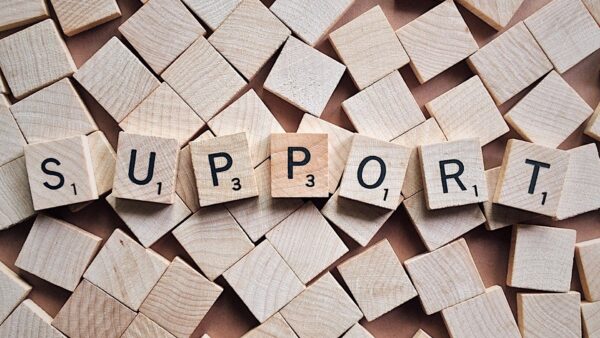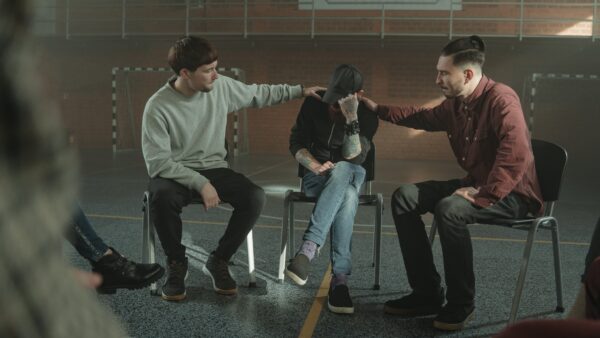9.1 Introduction
Most people experiencing homelessness demonstrate insecure relationship styles due to insecurity during times of distress in childhood, which lessened resilience during stressful events and caused emotional problems and poor adjustment.
An essential element of growth and development for people with insecure relationship styles is the undertaking of alternative ways of relating to others and controlling emotions. Peer support is an effective way to help people with mental challenges shift towards more secure modes of behavior, where they can deal more positively with distress (Jewels Rhode, 2014).
Peer supporters can foster this process of recovery by building a positive relationship with their client. Having common backgrounds implies not only understanding the struggles one has to go through during the recovery process, but also inspiring hope for those who are just beginning their journey towards a more stable and socially integrated life. Acting as role-models, peer supporters can represent an arrival point, while also providing support to achieve recovery. In the first stages of the relationship, peer supporters can act as icebreakers and, by actively listening to the requests and life narrative of their clients, they can make them feel understood, facilitating their engagement and building a sense of trust towards the social services’ staff. By sharing their own story, peer supporters can provide a helpful reference to those who might feel lost or overwhelmed by the number of challenges they’ll have to endure along their way to recovery. Building a positive relationship is also useful to the social services professionals who can benefit from the information gathered by peer supporters to better calibrate the plan of intervention.
9.2 Learning objectives
In this unit the learners will
- Learn about the positive components of peer relationship such as mutuality and empowerment
- Understand the differences between helper type relationship and empowering peer relationship
- Familiarize themselves with the concepts of power, choice and control in peer relationships
9.3 Mutuality and empowerment
Through the development of formalized peer support roles, people with lived experience are trained and employed to support others. An important aspect of mutuality is the capacity to engage in interpersonal conflict in a way that honors the connection as well as the possible discrepancies. Without the capacity to engage in growth-promoting conflict, authenticity — and thus genuine mutuality — is compromised. The capacity to accept vulnerability in each person and the ability to maintain oneself open to influence are essential in the peer relationship.
On the other side, empowerment is a social process that helps people gain control over their own lives. It is a process that fosters power (that is, the capacity to implement) in people, for use in their own lives, their communities, and their society, by acting on issues that they define as important for their lives.
Peer support is commonly understood to be a relationship of mutual support where people with similar life experiences offer each other support, especially as they move through difficult or challenging experiences. Peer workers are people with personal experience who are trained and employed to work in a formalized role in support of others in recovery. The peer worker role involves developing mutually empowering relationships; sharing experiences in a mode that inspires hope; and offering hope and support as an equal (Scottish Recovery Network, 2012).
Peer support is a strengths-based approach, which starts with what’s strong, not with what’s wrong, recognizing the individual as a whole person rather than only focusing on the problem. This creates a relationship which is forward looking and solution focused, and one which generates hope, all the time promoting resilience and a strengthened ability to cope with difficulty (Jewels Rhode, 2014).

Helper type relationship VS an empowering peer relationship
Although peers can play a fundamental role in recovery, they should focus on empowering the client instead of acting as problem-solvers for their peers. The latter mechanism is part of what is called a “helper type relationship”, which can be detrimental to the recovery process because it takes the responsibility away from the client, reducing their self-efficacy and the control they have on their lives. Peer supporters should work towards building an “empowering peer relationship”, which seeks equipping their clients with the tools helpful for recovering. Only this will allow the clients to overcome their fears and gain confidence in their ability to face change and embrace a different way of dealing with their problems.
Mowbray defines an ample role for Peer Support Workers: “peer support relationships can challenge unacknowledged stigma, discrimination, bias and emphasize full community inclusion over a singular focus on symptom management whilst instilling hope for recovery by role modeling that recovery is possible, helping service users sail systems and teaching successful coping strategies” (Mowbray et al, 1997, p. 398).
Empowerment is an important element of peer support as it refers to people’s ability to overcome the stigma, poverty, and social isolation that reinforce cognitive deficits, emotional insecurities, and social difficulties. Participation in peer support as either a provider or a recipient, usually result in an increased sense of independence and empowerment. Consistent engagement in peer support can increase solidity in work, education and training which all allow for a sense of empowerment. Davidson et al (1999) attribute these improvements in empowerment to the shifts in the way of thinking and behaving that occur when engaging in reciprocal peer support relationships.
An important point of peer support is the sense of acceptance and real empathy that the peer gains through a sharing relationship (Davidson et al 1999). In a qualitative study exploring the peer support relationship within mental health, Coatsworth-Puspokey et al (2006) found that consumers believed the experiential knowledge provided by peer support workers created a ‘comradery’ and a ‘bond’ which made them feel that their challenges were better understood.
Power, choice and control in peer relationships
Gaining control upon one’s own life implies the ability of choosing between different paths. Having the opportunity of making choices on the way to recovery can feel scary, since it is often necessary to change the ways a person deals with their own problems. But being in charge of the choices also brings the feeling of fulfillment once the goal is achieved. Starting with little objectives and moving towards bigger ones, leads to building up confidence in own abilities to reach better conditions of living and gaining sense of control of own life. Power, on the other hand, here refers to the amount of control a person has over what other people do, and that can be extremely helpful if used properly by peer supporters to help others achieve positive results. Peer supporters should use their power to help peers in making the right choices, always allowing the peers to be in charge of their changes and take responsibility for their own results.
To better achieve this goal, and to be more effective in supporting others, it is important to have a deeper understanding on how relationships work. To do so, we might consider the roles and the patterns of interaction that may emerge from a mutually empowering peer relationship. One of the authors that has described such complex phenomenon is Stephen Karpman, a transactional analyst that distinguishes three different roles in his model called the “Drama Triangle”: Victim, Rescuer and Persecutor.
Victim: victims frequently feel betrayed, imprisoned, powerless, and despairing. They believe they are at the mercy of the universe. They refuse to accept responsibility for their unfavourable circumstances and believe they lack the capacity to change their condition. Victims believe they are helpless or inept, and they place responsibility on the persecutors (can be other people or a particular situation or circumstance). They are continuously looking for rescuers to help them solve their problems. If the victims remain in their ‘dejected’ condition, they will be unable to make decisions, solve issues, change their present status, or feel any sense of satisfaction or accomplishment.
Rescuer: always interceding on sake of the victims and attempt to spare them from the harms. They feel blameworthy of standing by while individuals drown. Rescuers have the great purpose of saving others and consider it essential. They come up short to figure it out that by providing short-term fixes to victims, they keep them subordinate and disregard their real needs. This may be the reason why rescuers often feel tired, overburdened and unable to respond adequately as they are always engaged in the emergency of rescuing victims.
Persecutors: they are severe, forceful, and establish rules and limits. They have a tendency to believe that they must win at any cost. Without offering proper direction, support, or a solution to the situation, persecutors blame the victims and condemn the behavior of rescuers. They are critical and adept at spotting flaws, and they maintain order and rigidity in their management. They oppress the victims and may be a bully at times.
The roles described composed the Drama Triangle, a model of dysfunctional social interactions. You can work to change the Drama Triangle into a related positive model, called the Empowerment Triangle.
In the Empowerment Triangle Victims transform themselves into Creators, who focus on outcomes, rather than problems. Creators are focused on objectives instead of criticality. They clarify their objectives and assume responsibility to achieve the desired outcomes.
Rescuers change their role to Coaches, who care for and trust in Creators. They focus on empowering the Creators, and they work with them to help them reach their objectives. Coaches do not solve the problems; they help and coach the Creators in finding their own solutions.
Persecutors become Challengers, who show to the Creators the limits they can overcome. They think Creators are capable of making progress by taking actions and moving forward; they stimulate instead of criticizing or blaming.

Understanding and maintaining boundaries in formalized peer support
Being part of the recovery team, peer supporters must be mindful of the role they have. Due to the importance they have in establishing a mutual and positive relationship with their clients, it is fundamental that they keep in mind that it is more beneficial to lean towards an empathetic approach more than a sympathetic one. Maintaining boundaries means keeping the right distance to make the recovering person feel understood and supported while not falling for the temptation of providing immediately whatever they might ask, which would lead to a Helper type relationship as described above. Peer supporters should aim to make the recovering person feel welcome, while keeping in mind which is their role and the resources they have at their disposal:
- use personal recovery experience as a tool;
- attend in identifying and supporting the peer in crisis;
- facilitate self-direction and goal setting;
- communicate effectively with other treatment providers;
- make an environment of respect with peers;
- encourage peers to construct and follow their own recovery and wellness plans.
All these make it necessary to discuss and have present the subject of boundaries which are bind to the person’s values and fall into common categories: physical, mental, and emotional.
Most people can tell when someone raids their personal space boundary by standing too close. They may slant back, move away, or ask the other to move; they also may have different comfort levels with different individuals. People may be comfortable with their children, family, or close friends sitting close to them but their comfort level may be different with an unknown person. Many people also recognize when someone violates a mental or emotional limits, especially if it’s a blatant violation— someone is disrespectful, demeaning, or raises their voice at them. It can be more complicated when the person engaging in the boundary violation is someone you are working with professionally.
Balancing the kind of the relationship between the Peer Supporter and the Peer can be challenging. An essential component of a Peer Supporter is sharing his/her lived experience. By its very nature, Peer Support relationship has more fluid boundaries compared to a traditional client-professional relationship, which can be helpful in cultivating a supportive relationship. However, maintaining a balanced personal-professional relationship can be challenging, especially if the relation between the peers becomes more of a friendship and the boundaries loosen considerably.
Another boundary issue experienced relates to different lived experiences that the Peer Supporter may have in comparison to the Peer, which doesn’t have to be a problem, however if not handled adequately, could lead to unintentionally creating unrealistic expectations of recovery for the Peer. Therefore, it is important not to forget that certain aspects of the Peer’s journey may not be comparable to the Peer Supporters journey.
Finally, Peer support agents who work for organizations that once served them, may now work with peers who were clients at the same time the peer support agent was a client. However, in such situations it is a good idea to ask the peer support worker if there are any reasons why they cannot work with the client. It is also possible that the client does not want to work with a peer supporter who is familiar with the services. Thus, a current client may know a great deal about the peer support agent’s personal history and struggles, which could complicate their working relationship.
9.4 Further reading
- Barker, S. et a., Expert viewpoints of peer support for people experiencing homelessness: A Q sort study. Psychological Services, 16(3), 402–414, 2019.
- Barker, S. et al., Peer support critical elements and experiences in supporting the homeless: A qualitative study, 2018.
- Gasior, S., «Youth Homelessness: The Impact of Supportive Relationships on Recovery«). Electronic Thesis and Dissertation Repository, 2015.
- Miler, J.A., Carver, H., Foster, R. et al., Provision of peer support at the intersection of homelessness and problem substance use services: a systematic ‘state of the art’ review. BMC Public Health 20, 641, 2020.
- Scottish Recovery Network, Fundación INTRAS et al. Peer2peer. Vocational Training Course, 2015






